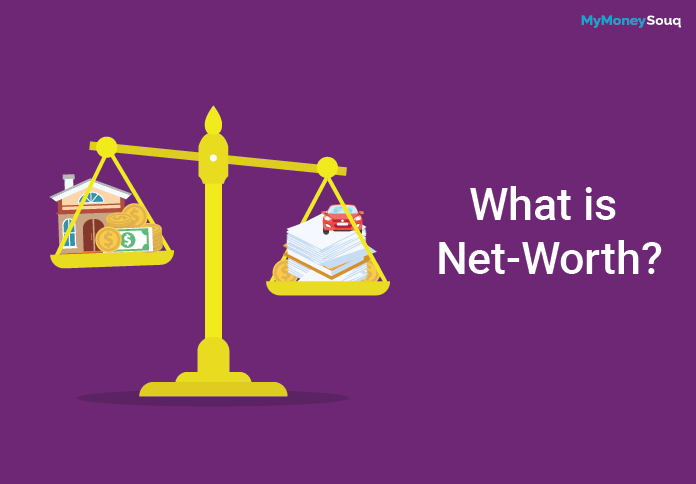Net-Worth is a term used to describe the financial value of an individual or the company. It describes the value of everything an individual or business owns after the liabilities are excluded. It’s a figure that is the result when you add up all your assets and subtract the liabilities.
In simple words, net worth is the cash value of everything you own like house, car, gold, savings account balance, checking account balance, etc. and subtracting this with the liabilities you hold like personal loan, home mortgage, car loan, etc. will give you the value of your Net Worth. The Net Worth can be a negative number which depicts that you have more liabilities than assets. If you sell out everything you own and clear the debts, the leftover cash is your Net Worth.
Check: 3 reasons why expats should consider investing outside their home-country
Types of Net Worth
Net Worth is not just applicable to individuals but also businesses, countries and sectors.
-> Net Worth in Individuals
The Net Worth in individuals is calculated by simply subtracting the liabilities from the assets the individual owns. The liabilities include all the debts like personal loan, credit cards, home mortgage, car loan, insurance policies, etc. While the assets include house value, car value, insurance policy maturity value, balance in savings and checking accounts, retirement accounts, etc. Whatever is left once all the debt is cleared after selling the assets, is the Net Worth of an individual. People who have a large chunk of cash leftover when they calculate the net worth are considered High Net Worth Individuals (HNI).
-> Net Worth in Companies/Businesses
Net Worth plays an important role in a company’s financial statement. It is something extensively examined by the shareholders, investors, banks and financial institutions of the company. The high net worth of the company will increase the value of the share of the company. If the net worth is low or negative then the share value of the company drops.
While calculating a company or business’s net worth, goods sold, vehicles, land, cash, corporate bonds, stocks, deposit certificates, etc. can be considered as assets and bank loans, salaries, taxes to be paid will be considered as liabilities.
Also, check: Worst Money Advice you’ll ever receive
How to Calculate Net Worth?
The calculation of Net Worth can be simple yet complicated. You must be aware of what to include in assets and liabilities.
Net Worth = Assets – Liabilities
For example, let us calculate an individual’s Net Worth.
Assets:
- Current House value: AED 450,000
- Current Car value: AED 60,000
- Savings account balance: AED 30,000
- Retirement savings: AED 50,000
Liabilities:
- Home Mortgage: AED 200,000
- Personal Loan: AED 50,000
- Credit Card: AED 20,000
Then Net Worth = Total Assets – Total Liabilities
= AED 590,000 – AED 270,000
= AED 320,000
Hence, the Net worth of an individual would be AED 320,000.
While calculating the Net Worth be conservative and use only the right values. Considering inflated values might not help you in getting the right result.
Why is it important to calculate Net Worth?
It is essential for every individual/business to know where they stand from a financial point of view at a particular time. It helps in tracking how much you are earning and what are the debts you owe to understand the money flow rightly. If the Net Worth is negative you can check ways to improve it and if it’s positive you can find ways to improve it or maintain the same. Overall, it helps in making the right financial decisions.
How often should you calculate your Net Worth?
Though there is no specific time to calculate Net worth, it is calculated quarterly or annually. If you have made any new purchases that will be an add-on to your assets then you can calculate it or if you have cleared any of the liabilities then you can calculate to find out the current net worth after the debt is cleared. Else, you can calculate it once a year.
Mistakes while calculating Net Worth
Mistakes while calculating Net Worth can affect you big time as net worth determines your financial status and you need to plan your finances according to the result you obtain.
Some of the most common mistakes that are made while calculating net worth are,
- Not understanding what to be considered as assets and liabilities. You must understand what is an asset and liability.
- Predicting wrong asset values like if the current value of the asset is AED 400,000 you might have calculated using low or high value.
- Missing out on some small debts
How to improve your Net Worth?
The way to improve your Net worth is simple and straight – You either need to improve the value of your assets or reduce the liabilities.
- You need to increase the value of your assets like buying a new house or car or considering other investment opportunities like gold, bonds, deposits, etc.
- Or you need to pay off your debts. Make a list of your existing liabilities, check which of those can be cleared easily with low early settlement charges if any. This way the liabilities ratio will decrease and improve your Net Worth.
Analyzing the Net Worth of an individual or business is important. It will help in understanding your financial worth and plan your finances accordingly.
About the author
Nikitha is a Senior Analyst at MyMoneySouq.com. She has been writing about personal finance, credit cards, mortgage, and other personal finance products in the UAE. Her work on Mortgage loans has been featured by the GulfNews and other popular Financial Blogs in the UAE.


